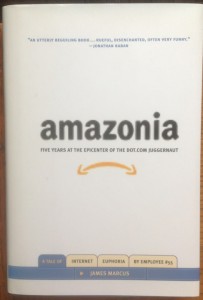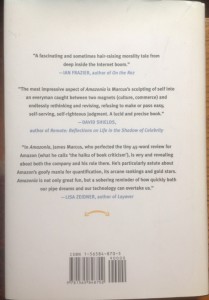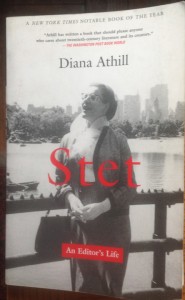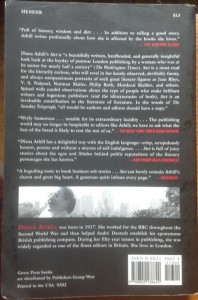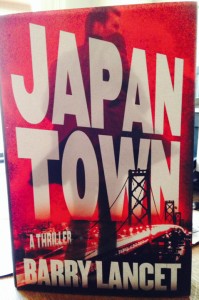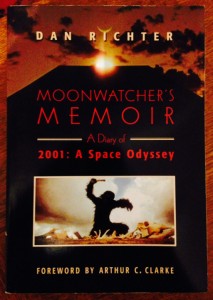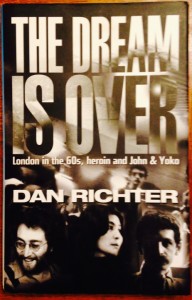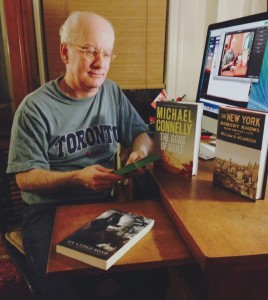 Dismissed from Byliner, the digital publisher in the Bay Area, editor Will Blythe opines in the NY Times today on why he declined to sign a legal waiver from his company that included a non-disparagement clause. Doing so, he forfeited 2 weeks’ pay, something he was willing to do for the sake of free expression and his self-respect. Here’s one of the nubs in his good column:
Dismissed from Byliner, the digital publisher in the Bay Area, editor Will Blythe opines in the NY Times today on why he declined to sign a legal waiver from his company that included a non-disparagement clause. Doing so, he forfeited 2 weeks’ pay, something he was willing to do for the sake of free expression and his self-respect. Here’s one of the nubs in his good column:
“As quaint as this may seem, giving up the right to speak and write freely, even if that means speaking or writing negatively, strikes me as the unholiest of deals for a writer and an editor to accept. Though such clauses don’t technically violate the First Amendment — I’d be explicitly agreeing to forfeit my right to speak freely if I signed [the] clause—such a contract has a paralyzing effect on the dissemination of the truth, with all of truth’s caustically cleansing powers. To disparage is but one tool in a writer’s kit, but it’s an essential one. That a company would offer money for my silence, which is what this boils down to — well, I’ve seen many a mob movie about exactly that exchange.”
Blythe’s column reminded me of when I was laid off by Sterling Publishing in January 2009, at what felt like the very bottom of the recession, an event I first wrote about in a personal essay called Three Years Ago Today, later republished at the website Over 50 and Out of Work while a condensed version of it appeared in print magazine NY UnderScore‘s Work issue. My bad news came a few days before President Obama’s 1st inaugural, oddly solving a dilemma I’d been pondering–of where and how I was going to observe the historic occasion. At least I got to watch it at home with my wife, some small comfort that dark week.
Similar to Byliner and its Department of Human Resources (some Orwellian label that one), Sterling’s HR director presented me with a waiver to consider. Mine, if signed, would produce a severance of salary and health insurance for 6 months. I had 3 weeks to decide if I would sign. Going farther than Blythe relates in his case, the waiver drafted for me from Sterling’s parent company Barnes&Noble required that I agree to quit any claims of wrongful dismissal based on age discrimination or for any other reason.
Thing is, there was a rub to that last point…
About six months earlier, during the summer of 2008, I had happened to receive via inter-office mail a memorandum generated by Sterling’s HR department that circumstantially placed me in a disfavored position relative to another employee, a junior colleague. Weird that I was even been on the distribution list for the memo, with its cryptic note about me at the bottom of it. I had quickly shown it to my supervisor and asked if he could give me an explanation for it. He was flustered and hollowly claimed it meant nothing at all, adding that it surely didn’t mean my status at the company was weakened in any way, relative to this younger colleague, or for any other reason. I persisted and since it had come from HR, I asked if we could speak with the director about it, or if he would. He said he’d talk with her and came back to me, again denying that the cryptic wording had any significance. From that point, I felt very unsure of my footing at the company.
I was very uneasy during the long holiday break of 2008-09. Lehman Brothers had collapsed in September and though President Obama was soon be inaugurated, I was terribly uneasy about what he was inheriting, what the economy would be like in the new year, and with layoffs in publishing having begun in late 2008–when longtime industry contacts such as Janice Goldklang were let go, in her case by Knopf–I worried I would lose my job, too. Soon after the end of vacation, on the morning of January 14, 2009, the same pair summoned me to the office of the HR director. They told me I was being let go. Hardly surprised, I was still shocked. Within a minute or two of hearing what they said, I thought of the mysterious memo I was still holding; if they’d thought back to the summer, they would’ve remembered that I brought it up months earlier and had been dissatisfied with their response. I thought, Good thing I have multiple copies of it in my personal files.
Handing me a folder, the HR director mentioned the details of the severance offer, and that there was a waiver they hoped I would sign, all enclosed in the packet. She finished, saying I should return to my office, pack up my stuff, and prepare to leave the building in no more than a couple hours. Anything I couldn’t pack then, they would ship to me at their expense (I remember being puzzled if she added that last bit because she believed I would find it magnanimous.) Numbly returning to my office one floor below, my computer access and company email had already been dissolved. That part of the experience–being suddenly cut off from my entire 2-year digital archive of work as Editorial Director of Sterling’s imprint of topical nonfiction, Union Square Press was, among other things, deeply disrespectful to the books and authors I left behind. But B&N, as a bookseller, and not really a publisher, didn’t care about that. Nor did Sterling–which is more of a pity. B&N had bought them in the early 2000s, a publisher of illustrated books, DIY, imports, packages, childrens books–it wasn’t a very heady list. They’d never developed a strong tradition of author cultivation. In the weeks immediately following my layoff I found the cutoff from the archive almost the most distressing thing. I was cut off, not only a non-person at Sterling, but maybe also in the book industry. That sudden alienation from one’s professional class was so disturbing over many months that when Over 50 and Out of Work was going to reprint Three Years Ago Today the editor of the site retitled it Warding off the “Demons of Disemployment,” a phrase I used when she interviewed me on the phone.
How working at a publicly-traded corporation is different than working at other companies
I’ve observed in my case, and later mass layoffs there, that it’s B&N’s custom to barely confirm to book industry news outlets when these nasty episodes occur. B&N’s aversion to coverage in these instances, and in other areas, is a decided part of its corporate culture. When my Sterling tenure began in 2007, one of the assets I thought I was bringing the company was that quite often my books, beginning when I signed them up, not just when they were published, would get a lot of early coverage. This became especially true in the early 2000s, when the Internet began changing the way I worked as a book editor, allowing me to publicly cultivate a professional reputation as a keen-eyed and proactive editor who wanted to publish ‘ripped-from-the-headlines’ titles by such public figures as Susan MacDougal, jailed during Whitewater, with whom I edited and published THE WOMAN WHO WOULDN’T TALK: Why I Refused to Testify Against the Clintons and What I Learned in Jail (2002) a New York Times bestseller; Ambassador Joseph Wilson, whose wife, Valerie Plame, endured the leaking of her CIA status by multiple members of the Bush administration, after which Joe and I connected and he wrote THE POLITICS OF TRUTH: Inside the Lies that Put the White House on Trial and Betrayed My Wife’s CIA Identity (2004), a New York Times and Publishers Weekly bestseller that later became the basis in part for the film, “Fair Game”; and Lt. Gen Romeo Dallaire, who as head of the UN’s peacekeeping force in Rwanda in 2003-04, urged a more robust force that would have probably pre-empted the genocide that followed, in which mroe than 800,000 people died, even while he and his small force saved more than 25,000 displaced persons. In 2006, I published his book, then already a Canadian bestseller, SHAKE HANDS WITH THE DEVIL: The Failure of Humanity in Rwanda, with a new Introduction by Samantha Power, a Washington Post bestseller.
About my editorial mission, I wrote in my professional bio at the time that I seek to publish books
“By and about truthtellers, whistleblowers, muckrakers, revisionist historians, and singular witnesses–people who’ve been through some crucible of experience that’s made them the only one who could tell that story, giving them elevated author-ity and enhanced credibility to readers.”
With the growth of the Web in the early and mid-2000s–even though there was no social media yet–I was able to begin reporting my book acquisitions and developments about my authors. One of the very first places was the website created by Michael Cader, with whom I spent time at a conference in 2000, just as he was beginning Publishers Lunch, his website now known more broadly as PublishersMarkletplace.com. I was kind of a charter member there, on the site from the very beginning, reporting my new book acquisitions in the daily deal reports. I did that over my entire seven-year tenure with Carroll&Graf of Avalon Publishing Group, a job I left as editor-in-chief in the last weeks of 2006. Arriving at Sterling a few weeks later in the first weeks of 2007, I learned right away that I would be asked to clear all announcement of new book deals and news about my books through Sterling’s publicity department, and thence through B&N’s corporate PR department, before I could have approval to send out the announcement or news. Over time, it got worse–the senior person in Sterling’s publicity department finally told me B&N really didn’t want me to announce any more new book deals.
I believe the aversion of B&N management to publicity–its opaque default–may be rooted in the company’s status as a publicly-traded corporation, with investors to whom they periodically report and stock that goes up and down every day. Managers seemed motivated to minimize anything, including Web mentions of important new nonfiction books that might lead to additional coverage, stirring up controversy that could somehow jiggle the stock price. They acted as if, in managing the company they were custodians of a delicate patient, a body that shouldn’t be disturbed often. With such a blank public face, word of my dismissal among Sterling colleagues, and that of others let go the same day–some from Sterling and some from B&N itself–traveled only by hushed word-of-mouth.
I’ve observed that when people are forced like this to leave a company within hours of their hushed termination, it’s like a scandalous death in the family, dealing a terrible disservice to departing employees. Publishing colleagues outside of Sterling did learn of it within a day or two, but not because of any corporate communications by B&N. I spoke with the blog Moby Lives and they ran a news item the next day, Mass Firings at BN*. By contrast, other publishing companies, including HarperCollins, which I wrote about in a 2012 post called If It Must Be Done–A Model for Laying Off People Decently, have openly named and thanked people being dismissed, a much healthier practice.
Exploring my legal options and making a decision…
Once I soberly considered the severance offer and read and re-read the waiver, and began discussing it with my family, a part of me believed the company was basically trying to get me to acquiesce to having been discriminated against on the basis of my age. I reminded the HR director of the mysterious memo from the summer before and again asked for an explanation, especially now in light of my termination. Her responses were just as unilluminating as before. I persisted, saying I now believed it likely that the decision to dismiss me had been at least in part related to my age (54 at the time). She denied this. I wondered if the language disclaiming age discrimination in my waiver had been bulked up in my version of it. I tried negotiating for improved terms on the severance, but I got nowhere with that request. When I called to ask a question, or press a point she clearly had little time for it, or me. From the corporation, the message was clear: “Sign the waiver and take the offer, or don’t. You are free to walk away. Just tell us your decision.”
Affronted by what at minimum were obvious prevarications by my former colleagues–and smarting personally from the layoff, even with it coming amid the much wider collapse–I visited a lawyer to explore my options. He examined the record, and agreed it was all very odd, but reminded me how hard it could be to get satisfaction, or justice, if I sued. He suggested I consult with the Equal Employment Opportunity Commission (EEOC), whose charter explains that it is “responsible for enforcing federal laws that make it illegal to discriminate against a job applicant or an employee because of the person’s race, color, religion, sex (including pregnancy), national origin, age (40 or older), disability or genetic information.” I visited the NY office in lower Manhattan and met with a staff attorney who sat under a photo portrait of President Obama, one that could’ve been hung on the wall only a few days earlier. Taking time to hear me and read the record I showed him, he actually raised an eyebrow and commented that in his professional judgment I probably had a case of age discrimination and wrongful termination, and that he and the agency would help me pursue it if I chose to do so. However, he too added that pursuing my claim to its conclusion could take 2-3 years, with no definite outcome. Ultimately, amid the worst economic climate of my lifetime, I decided to sign the waiver and accept the severance. I ached for justice, and still do, but it just wasn’t prudent to pursue it. That’s the way the corporation wanted to me to feel. I’ll add that though I didn’t ask the EEOC to help me pursue my claim, I am very glad that this excellent agency exists as part of of the federal government.
One thing that Will Blythe’s column and my experience illustrate is the blight that today’s HR mindset casts on our culture, full of its own hermetic vocabulary, with bland euphemisms, opaque acronyms, and inhumane doublespeak. I hope Blythe’s access to his computer was not shut off the same instant he got his layoff notice, and that he was given more than a few hours to vacate his office. Shunning and banishment are two of the signature modes of behavior in the HR-ization of modern life.. I respect Blythe for making the decision he did, though two weeks’ pay is a lot different than six months’ worth of pay and health insurance. Looking back on my decision nearly 5 years ago, I’m convinced the company that formerly employed me got off very cheaply.
* Trying to get better link for this from Melville House/Moby Lives

